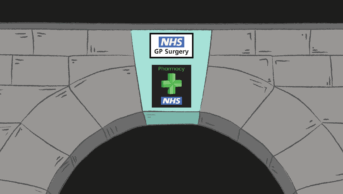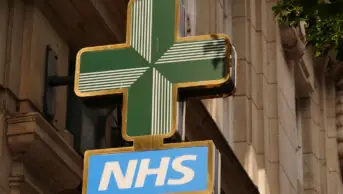
Shutterstock.com
Community pharmacies across the Midlands are being prevented from signing up to provide a locally-commissioned minor ailments service because of an NHS England review of how antibiotics are supplied.
A letter sent to pharmacies in January 2022, seen by The Pharmaceutical Journal, reveals that the service has been “paused” after NHS England commissioned a review of the safety and effectiveness of community pharmacy services where antibiotics are supplied without a prescription.
The letter only addresses pharmacies in the Midlands region. NHS England has not responded to requests for comment on whether the review extends into other regions.
While pharmacies currently providing the service can continue to do so, local pharmacy representatives have said they were “shocked and surprised” by the decision to pause recruitment.
Pharmacies were informed of the changes in a letter sent in January 2022, signed by Amanda Alamanos, senior primary care transformation lead at NHS England and Improvement — Midlands.
The letter said NHS England’s Antimicrobial Resistance Programme Board requested that the Department of Health and Social Care “commission a National Institute for Health Research (NIHR) programme of work to look at the quality, safety, effectiveness and appropriateness of new and existing clinical services to manage infection provided by community pharmacies and other care settings, including the supply of antimicrobials without a prescription under the legal direction of a patient group direction (PGD)”.
The letter added that “a decision has been made regionally to suspend any new SLA [service level agreement] sign-ups to the Midlands Region Extended Care tier 1 and tier 2 services with immediate effect”.
“Community pharmacies currently providing tier 1 and tier 2 services can continue to provide services to patients as normal,” the letter said.
The extended care service was first commissioned by NHS England and Improvement — Midlands in December 2020, with pharmacies providing tier 1 of the service able to offer treatments for urinary tract infections and acute bacterial conjunctivitis, while those offering tier 2 can also supply treatments for impetigo, infected eczema and infected insect bites.
Commenting on the letter from NHS England and Improvement — Midlands, Stephen Nobel, chief executive officer of Dudley Local Pharmaceutical Committee (LPC), said: “Everyone in the Midlands was shocked and surprised by the decision to curb the extended care service.
“As I understand it, no new areas will be permitted in starting up their own scheme, and rather than withdraw the service we have in the Midlands, the current PGDs authorising the supply of those antibiotic preparations will not be renewed after their May 2022 expiry.”
Noble added that the LPC was “told that the decision was made by the antimicrobial resistance board, who did not want an extension of antibiotic prescribing across pharmacy”.
He said that the LPC “hopes that the PGDs may be renewed”, adding that the service “could be developed and rolled out nationally, perhaps part of a national minor ailments scheme”.
Simon Hay, services development officer for Staffordshire and Stoke LPCs, said he believes “the work is to standardise PGDs across care settings and across different professions”.
“Using pharmacists to deliver services like this does support the NHS ideals of improving patient access and reducing GP workload pressures, so it would be counter-intuitive to terminate them,” he said.
Hay added that while he believes that all community pharmacies who wanted to provide the service in Staffordshire and Stoke have already signed up, “other areas of NHS Midlands have not had the services commissioned, so I’m guessing there may still be contractors who would like to offer them but have not yet returned the contract”.
“They will not now be able to offer their patients these services until the review is complete,” he said.
Ali Din, chief officer of Sandwell LPC, said the pause is a “retrograde step” but the region “had no choice given the national antimicrobial advice”.
“We believe that to be wrong and mistaken. Pharmacists are responsible, professional and there is no evidence of overuse of antibiotics in pharmacy-commissioned services to justify [this] roll back in clinical services, which benefit patients and our busy GP practices,” he said.
The review comes after preliminary data from the Welsh community pharmacies providing a sore throat treatment service suggest that the rate of antibiotic supply more than doubled during the peak of the COVID-19 pandemic, when remote consultations were more widely used.
NHS England, the DHSC and NIHR did not respond to enquiries about the programme of work underway.
Read more: When will England get a ‘Pharmacy First’ service?
What is a ‘Pharmacy First’ service?
The term ‘Pharmacy First’ means slightly different things depending on where you live.
In Scotland, the ‘NHS Pharmacy First’ service launched in July 2020, offering anyone living in Scotland the opportunity to receive treatments, including antibiotics, from a pharmacist for minor illnesses, such as urinary tract infections, impetigo and acne.
As of November 2021, more than 2 million consultations had been carried out through the service since its launch and, according to Public Health Scotland 2021 contract activity data, nearly 1.9 million of these occurred in the first nine months of 2021, earning pharmacies a total of £23.3m.
Meanwhile, in England, there are some local minor ailments services, some of which are using the term ‘Pharmacy First’.
According to a services database maintained by the Pharmaceutical Services Negotiating Committee (PSNC), as of 17 September 2021 there were 22 such services ongoing in specific areas, 9 of which are commissioned by NHS England and the rest by individual clinical commissioning groups.
The treatments offered through these local services vary by area, with some only offering to treat walk-in patients with uncomplicated urinary tract infections. Others, including the ‘Pharmacy First’ service in Liverpool that launched in January 2022, enable pharmacists to treat a range of services, such as a newly launched point-of-care test and treat service for acute cough.
Health secretary Sajid Javid said in October 2021 that his department was in talks with NHS England about implementing a national minor ailments service in England, later inferring that a government policy was under development.


